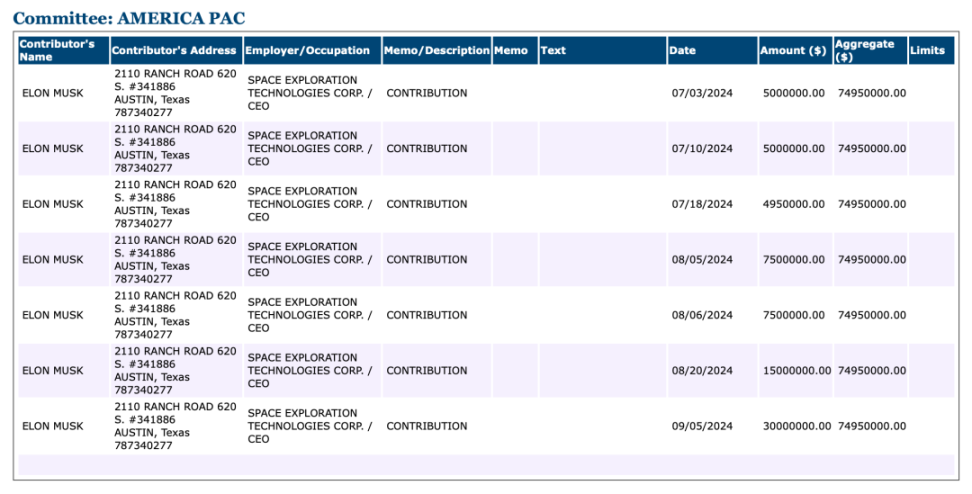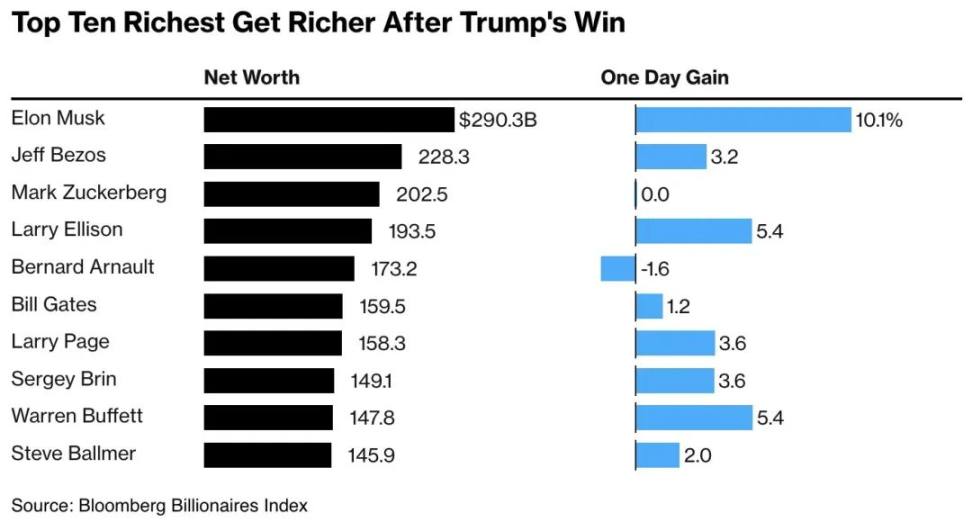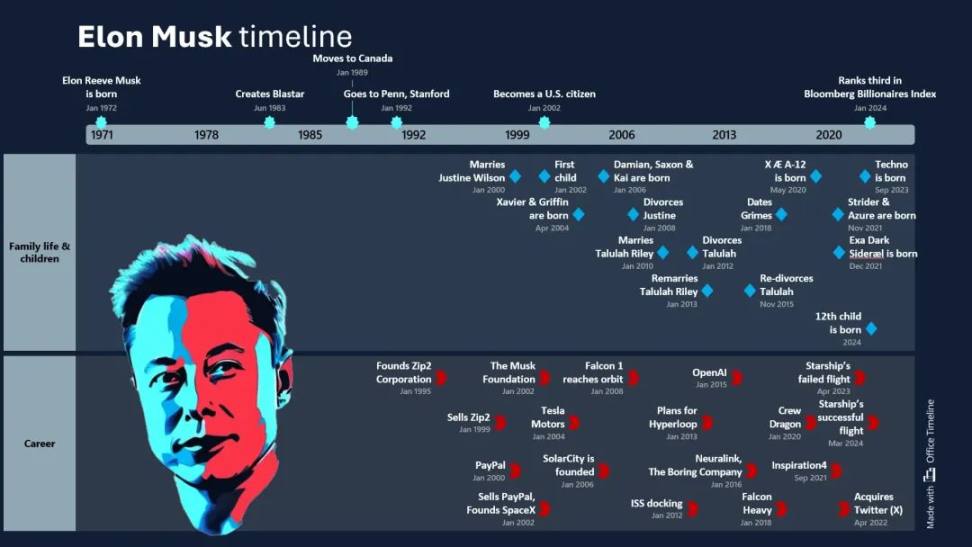If Zhang Juzheng is a model of being skilled in statecraft but clumsy in personal affairs, then Musk is the embodiment of Lü Buwei, finding more success in political venture capital than in business.
Written by: Zuo Ye
A big boy turns into a little girl, the awakened Musk angrily shifts to the Republican Party, realizing today that I am me. After finishing Elden Ring, on October 28, 2022, Musk purchased Twitter for $44 billion.

People were unclear about Musk's true feelings at the time. The entire Silicon Valley and the Democratic Party have been intertwined for over 30 years. Even if some are dissatisfied with the Democratic Party, they usually just try to balance things out by donating to both parties. A businessman like Musk, who is all in for Trump, is indeed too unconventional.
But at least his longtime friend Peter Thiel can understand all of this. Peter Thiel is a backer of Vance, and Musk's gamble is indeed on Trump. One bright, one dark, one positive, one negative; rather than saying this election is a victory for Trumpism, it is more accurate to say it is a comeback for Musk and Peter Thiel.
Ultimately, Musk is a businessman who hopes that the costs he incurs will generate more profits. Especially since betting on politics has direct consequences that can lead to periodic reckoning. Winning this election is one thing, but what about four years later, or eight years later? Only by becoming a true controller can one remain invincible. Musk's thinking is also quite simple: to become the spokesperson for the entire American high-tech industry, to become the new benefactor of millions of workers, thus naturally weathering political fluctuations.
This article aims to roughly estimate how much Musk has invested in this election and what the direct and expected returns might be.
"How many times the profit from farming?" It is said: "Ten times." "How many times the profit from pearls and jade?" It is said: "A hundred times." "How many times the profit from being the ruler of a nation?" It is said: "Countless."
- Twitter cost $44 billion, but he did not pay in cash; instead, he used Tesla stock as collateral to borrow, with Sequoia providing $800 million.
- America PAC, PAC stands for Political Action Committee, allows Musk to exceed the limits on individual small donations and make other contributions. Musk's personal donations range from $110 million to $177 million.

The above are the two largest expenditures, with direct donations around $100 million. However, purchasing Twitter is clearly aimed at aiding Trump's political campaign and is included in the calculations.
Next, let's consider Musk's potential profits. First, there is the much-anticipated rise in Tesla stock, with his personal wealth surging by 10% in a single day. Musk holds 20.5% of Tesla shares, and before acquiring Twitter, he held about 22%. After acquiring Twitter, he went through a selling period, and the market generally believes this debt belongs to Musk personally.

Let's do some calculations. Of the $44 billion used to acquire Twitter, $13 billion is attributed to Twitter's debt, while Musk sold approximately $23.08 billion worth of stock at market price before and after the acquisition. Considering Musk's acquisition of Twitter is purely political speculation, the true cost of his investment in this election is 230.8 + 1.77 = $23.257 billion, because Twitter's commercial value is significantly lower compared to social products like Facebook, Instagram, and WhatsApp.
Calculating based on a cost of $23.257 billion, it is clear that Musk's return cannot be calculated as (2900-2620)/1.77=158 times within 5 days. If such a good business existed, then all speculators in the financial market would be crazy to participate. Musk's actual profit should be (2900-2620) - 23.257 = $4.743 billion, which is more reasonable.
Of course, no matter how you calculate it, it's all for fun, and everyone shouldn't get too hung up on it. Interestingly, Musk's additional profits mainly come from Bitcoin, Dogecoin, and anticipated future government contracts, which may be the real big gains.
The wisdom of humanity is contained in two words: hope and waiting.
Musk has been preparing for the Republican - Trump victory for two years, but he has been pulling orders for SpaceX for over ten years, mainly government contracts. This is similar to how Tesla initially survived by selling carbon credits. Once a business reaches a certain scale, it is impossible not to engage with the government and enterprises. Considering these factors, let's see how much Musk could theoretically earn after this election.

Description: Elon Musk's personal timeline, image source: https://www.officetimeline.com/blog/elon-musk-timeline
First, Musk holds Bitcoin through Tesla, currently possessing 11,509 Bitcoins, which is the remaining portion of the 43,200 Bitcoins purchased for $1.5 billion in 2021, with an average purchase price of around $35,000. Although Tesla has sold some of it, incurring both losses and gains, the current value of this portion of Bitcoin is $860 million. Given the frequent price fluctuations and that this is not significant for Musk's billion-dollar net worth, we can tentatively estimate an expected profit of $1 billion.
Next is the profit from Dogecoin, which is indeed difficult to calculate. Although Musk is very likely to hold Dogecoin, it cannot be confirmed or verified, so it can only be considered a part of Musk's concept stocks/coins, which is really hard to quantify.
Finally, regarding government contracts, contrary to popular belief, the proportion of U.S. government fiscal spending to GDP has remained stable at around 40-50% for many years. Government contracts are crucial for large companies, especially high-tech firms. For example, Amazon's CEO Bezos, who announced neutrality, lost out on a $10 billion government cloud service contract to Microsoft Azure because he offended Trump. To add, although Gates donated $75 million to Harris, Microsoft has also donated significantly to the Republican Party and has cut its own DEI department (Diversity, Equity, and Inclusion), showcasing a flexible political positioning.
Currently, Musk's companies include SpaceX, Twitter (X), Tesla, The Boring Company, Neuralink, and xAI, with the main products capable of obtaining government contracts being rocket launches and Starlink communication services. For instance, by the end of Trump's first term in 2020, Musk had secured around $8 billion in government rocket launch contracts, primarily from NASA and the Air Force.
At present, with Boeing's struggles (two astronauts are still in space), and Bezos's Blue Origin progressing slowly, rocket launch contracts are expected to increase significantly during Trump's second term. In June of this year, NASA awarded SpaceX a contract worth $843 million.
Additionally, the U.S. government will strengthen support for next-generation communication networks, and Starlink has already secured a $70 million contract from the U.S. Space Force. These services will further increase with Trump's presidency.
Conclusion
If Zhang Juzheng is a model of being skilled in statecraft but clumsy in personal affairs, then Musk is the embodiment of Lü Buwei, finding more success in political venture capital than in business. With an investment of $23 billion and a two-year layout, just the Tesla stock price alone recouped the cost within five days, yielding nearly $5 billion in profit.
In the long run, government contracts and subsidies over the four-year period will become more tangible with the increasing realization of D.O.G.E. Although the top brother claims to cut $2 trillion in government spending, it certainly does not include his own government contracts.
免责声明:本文章仅代表作者个人观点,不代表本平台的立场和观点。本文章仅供信息分享,不构成对任何人的任何投资建议。用户与作者之间的任何争议,与本平台无关。如网页中刊载的文章或图片涉及侵权,请提供相关的权利证明和身份证明发送邮件到support@aicoin.com,本平台相关工作人员将会进行核查。




